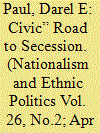| Srl | Item |
| 1 |
ID:
172506


|
|
|
|
|
| Summary/Abstract |
Civic nationalism is a weak vessel for secession. Nonetheless, contemporary Scottish nationalism has proven unusually successful, using the characteristically civic marker of political ideology as its signature boundary mechanism. Because a civic form of nationalism funnels toward civic markers of national identity, nationalist elites define Scotland as social democratic and England as neoliberal. This symbolic cultivation of a Scottish social democratic essence is deeply ethnic, however, through a mythological fusion of ideology with genealogy characteristic of ethnic myths of descent. Scotland’s “civic” nationalism points up the confused nature of the ethnic-civic dichotomy itself.
|
|
|
|
|
|
|
|
|
|
|
|
|
|
|
|
| 2 |
ID:
109159


|
|
|
|
|
| Publication |
2011.
|
| Summary/Abstract |
It's a commonplace that Federal Reserve chairman Ben Bernanke draws his policies from Milton Friedman and Anna Schwartz's A Monetary History of the United States (MH). With that in mind, this article establishes five points. First, contrary to conventional wisdom, Friedman and Schwartz merely insinuate their claim the Fed caused the Depression in MH. Second, their criticisms of Fed policy during the Depression, which turn on its refusal to adopt open market purchases (OMPs), repudiate Friedman's famed libertarianism and market fundamentalism. Third, Friedman and Schwartz don't refute the practical objections of bankers who opposed OMPs in the 1930s. Consequently, Bernanke's policies for addressing the financial crisis risk doing precisely what Friedman's targets warned against-encouraging financial speculation without addressing problems of unemployment. Fourth, Friedman and Schwartz's prescriptions entail a neoliberal, not a libertarian, state, one governed by technocrats and answerable to financial markets. Finally, what accounts for and unifies Friedman's contradictions is the beneficiary-finance.
|
|
|
|
|
|
|
|
|
|
|
|
|
|
|
|